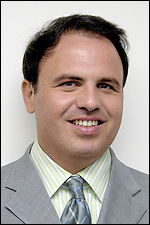A Faster, Easier Way to Diagnose Metabolic Disorders in Infants
A proposal to create an inexpensive sensor for the rapid, point-of-care diagnosis of metabolic disorders in infants has earned professor and associate dean Peter Kofinas (Fischell Department of Bioengineering [BioE]) the Clark School's first Translational Sciences Grant from the National institutes of Health's National Center for Advancing Translational Sciences.
The project, conducted in collaboration with the Children's National Medical Center, will develop a system capable of detecting diseases such as hyperammonemia (a urea cycle disorder resulting in excess ammonia in the body) and phenylketonuria (an inability to metabolize an enzyme found in many foods) based on the analysis of a blood sample.
Left untreated, hyperammonemia and phenylketonuria can lead to a lack of cognitive development, behavioral and neurological problems, seizures, encephalopathy, and even death. Early diagnosis and management of these diseases are critical for a child to develop normally and remain healthy in adulthood, but afflicted babies may not express obvious symptoms until they are several months old.
Kofinas' goal is to make screening for these metabolic disorders easy and cost-effective enough to perform in any doctor's office, well before the conditions advance to the point of doing substantial harm.
"Our sensor device will be based on inexpensive components that require minimal training to operate," he says, "leading to reduced health care costs for the patient and the prevention of complications that impair mental health."
November 8, 2012 Prev Next |


